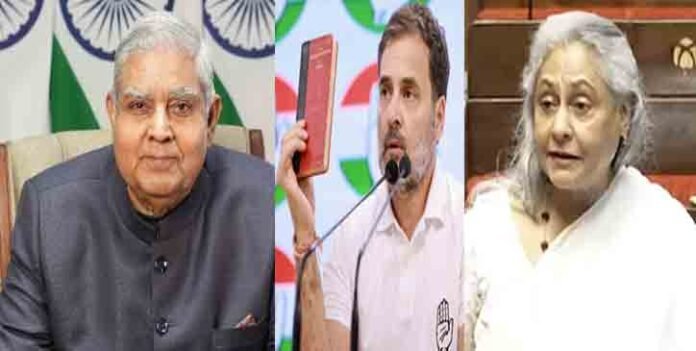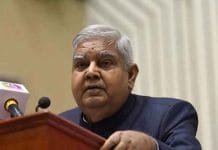The opposition in India has once again stirred political discourse by submitting a no-confidence motion against Jagdeep Dhankhar, the Vice President and Chairman of the Rajya Sabha. This significant move, filed under Article 67(b), marks a critical juncture in parliamentary proceedings. Let us analyze the circumstances surrounding this bold action, its potential implications, and the reactions it has sparked among political factions.
Understanding the No-Confidence Motion Against Jagdeep Dhankhar
A no-confidence motion is a tool available to the legislature to express dissatisfaction with a leader’s conduct or performance in their official role. In this instance, the notice against Jagdeep Dhankhar comes with the endorsement of 60 MPs, exceeding the mandatory requirement of 50 signatures. The motion reflects the opposition’s grievances regarding Dhankhar’s conduct as the Chairman of the Rajya Sabha.
As per reports, the notice was formally submitted to Rajya Sabha Secretary-General P.C. Modi, signaling the opposition’s intent to hold Dhankhar accountable. This procedural step highlights the opposition’s discontent with the presiding officer’s handling of parliamentary affairs, including alleged biases and perceived disregard for the neutrality expected in his position.
Key Players Supporting the Motion
The INDIA Alliance, a coalition of opposition parties comprising the Congress, Aam Aadmi Party (AAP), and Samajwadi Party (SP), is the driving force behind this move. While the coalition remains united on this front, internal divisions persist within the opposition. Notably:
- Trinamool Congress (TMC) has yet to clarify its position on the matter, adding a layer of uncertainty to the coalition’s strategy.
- Biju Janata Dal (BJD), led by Naveen Patnaik, has adopted a cautious stance, emphasizing a thoughtful approach to the proposal.
Despite these variances, the opposition has displayed remarkable coordination in initiating this significant parliamentary challenge.
The Government’s Response to the Motion
Central Parliamentary Affairs Minister Kiren Rijiju criticized the opposition’s move, deeming it an insult to the dignity of the parliamentary chair. He asserted that Dhankhar, with his roots in a humble farming background, has consistently championed the welfare of farmers and the common people. Rijiju expressed unwavering support for Dhankhar, emphasizing his leadership qualities and impartial guidance in legislative matters.
Furthermore, the National Democratic Alliance (NDA) has reiterated its confidence in Jagdeep Dhankhar’s stewardship. The government enjoys a majority in the Rajya Sabha, which strengthens Dhankhar’s position amid this political turmoil.
Historical Context: Previous Attempts by the Opposition
This is not the first instance of a no-confidence motion targeting Dhankhar. In August, a similar initiative was proposed but failed to garner sufficient signatures to proceed. The opposition’s renewed attempt demonstrates its persistence and a sharpened strategy, reflecting heightened tensions between the ruling coalition and opposition parties.
The Legal and Constitutional Perspective
Article 67(b) of the Indian Constitution empowers the Rajya Sabha to initiate a motion against its Chairman. For the motion to advance, it must meet specific criteria:
- Minimum Signatures: At least 50 members must sign the notice to validate the proposal.
- Parliamentary Debate: Once admitted, the motion is subjected to a thorough debate in the Upper House.
- Voting Requirements: A two-thirds majority is necessary for the motion to succeed.
Given the NDA’s numerical strength in the Rajya Sabha, the opposition faces an uphill battle in translating its motion into a successful outcome.
Public and Media Reactions
The motion against Jagdeep Dhankhar has ignited significant public and media attention. Political analysts view this as a strategic maneuver by the opposition to question the BJP-led government’s democratic practices. The move is perceived as an attempt to amplify opposition unity ahead of upcoming electoral battles, particularly the 2024 General Elections.
Media commentary has largely centered on Dhankhar’s role in maintaining decorum in the Rajya Sabha and whether his actions have upheld or undermined the institution’s integrity.
Possible Outcomes and Implications
The filing of a no-confidence motion has far-reaching political implications, including:
- Strengthening Opposition Unity: The move offers a platform for opposition parties to showcase collective strength, especially under the INDIA Alliance banner.
- Government’s Defense: The ruling coalition has an opportunity to solidify its majority stance by showcasing unwavering support for Dhankhar.
- Institutional Debate: The motion will likely trigger intense discussions about the responsibilities and neutrality of parliamentary presiding officers.
However, with the NDA’s majority in the Rajya Sabha, the motion is unlikely to succeed. Nonetheless, the debate surrounding it could serve as a litmus test for the opposition’s effectiveness in challenging the government.
A Precursor to Broader Political Battles
The no-confidence motion against Jagdeep Dhankhar symbolizes a broader struggle between the ruling coalition and a resurgent opposition. While the motion’s chances of success remain slim, its significance lies in its ability to spark critical debates about parliamentary governance and the role of presiding officers in maintaining impartiality.
As political dynamics continue to evolve, this episode underscores the vibrancy of India’s democratic processes and the pivotal role of opposition parties in holding the government accountable. The coming days will reveal whether this motion is a mere symbolic gesture or a catalyst for deeper political changes.
















